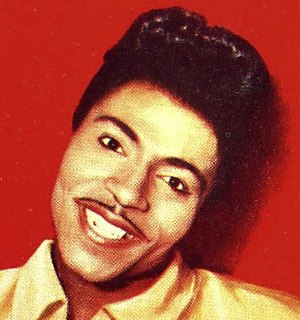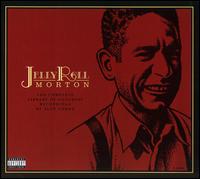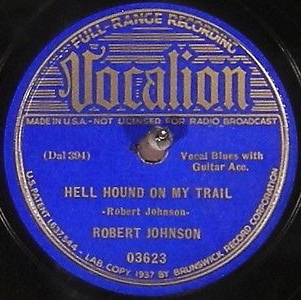Related Research Articles

Arthur Blake, known as Blind Blake, was an American blues and ragtime singer and guitarist. He is known for recordings he made for Paramount Records between 1926 and 1932.

Lemon Henry "Blind Lemon" Jefferson was an American blues and gospel singer-songwriter and musician. He was one of the most popular blues singers of the 1920s and has been called the "Father of the Texas Blues".
Rock and roll is a genre of popular music that evolved in the United States during the late 1940s and early 1950s. It originated from black American music such as gospel, jump blues, jazz, boogie woogie, rhythm and blues, as well as country music. While rock and roll's formative elements can be heard in blues records from the 1920s and in country records of the 1930s, the genre did not acquire its name until 1954.

"Rock Around the Clock" is a rock and roll song in the 12-bar blues format written by Max C. Freedman and James E. Myers in 1952. The best-known and most successful rendition was recorded by Bill Haley & His Comets in 1954 for American Decca. It was a number one single for two months and did well on the United Kingdom charts; the recording also reentered the UK Singles Chart in the 1960s and 1970s.

Doo-wop is a genre of rhythm and blues music that originated among African-American youth in the 1940s, mainly in the large cities of the United States, including New York, Philadelphia, Pittsburgh, Chicago, Baltimore, Newark, Detroit, Washington, DC, and Los Angeles. It features vocal group harmony that carries an engaging melodic line to a simple beat with little or no instrumentation. Lyrics are simple, usually about love, sung by a lead vocal over background vocals, and often featuring, in the bridge, a melodramatically heartfelt recitative addressed to the beloved. Harmonic singing of nonsense syllables is a common characteristic of these songs. Gaining popularity in the 1950s, doo-wop was "artistically and commercially viable" until the early 1960s, but continued to influence performers in other genres.

Richard Wayne Penniman, known professionally as Little Richard, was an American musician, singer, and songwriter. He was an influential figure in popular music and culture for seven decades. Described as the "Architect of Rock and Roll", Richard's most celebrated work dates from the mid-1950s, when his charismatic showmanship and dynamic music, characterized by frenetic piano playing, pounding back beat and raspy shouted vocals, laid the foundation for rock and roll. Richard's innovative emotive vocalizations and uptempo rhythmic music also played a key role in the formation of other popular music genres, including soul and funk. He influenced numerous singers and musicians across musical genres from rock to hip hop; his music helped shape rhythm and blues for generations.

Dinah Washington was an American singer and pianist, who has been cited as "the most popular black female recording artist of the 1950s songs". Primarily a jazz vocalist, she performed and recorded in a wide variety of styles including blues, R&B, and traditional pop music, and gave herself the title of "Queen of the Blues". She was a 1986 inductee of the Alabama Jazz Hall of Fame, and was inducted into the Rock and Roll Hall of Fame in 1993.

Delta blues is one of the earliest-known styles of blues. It originated in the Mississippi Delta, and is regarded as a regional variant of country blues. Guitar and harmonica are its dominant instruments; slide guitar is a hallmark of the style. Vocal styles in Delta blues range from introspective and soulful to passionate and fiery.

Willie Mae Thornton, better known as Big Mama Thornton, was an American rhythm-and-blues singer and songwriter. She was the first to record Leiber and Stoller's "Hound Dog", in 1952, which became her biggest hit, staying seven weeks at number one on the Billboard R&B chart in 1953 and selling almost two million copies. Thornton's other recordings included the original version of "Ball and Chain", which she wrote.

Ida Cox was an American singer and vaudeville performer, best known for her blues performances and recordings. She was billed as "The Uncrowned Queen of the Blues".

Darlene Wright, known professionally as Darlene Love, is an American singer and actress. She was the lead singer of the girl group the Blossoms and she also recorded as a solo artist.

Sister Rosetta Tharpe was an American singer and guitarist. She attained popularity in the 1930s and 1940s with her gospel recordings, characterized by a unique mixture of spiritual lyrics and electric guitar that was extremely important to the origins of rock and roll. She was the first great recording star of gospel music and among the first gospel musicians to appeal to rhythm-and-blues and rock-and-roll audiences, later being referred to as "the original soul sister" and "the Godmother of rock and roll". She influenced early rock-and-roll musicians, including Little Richard, Johnny Cash, Carl Perkins, Chuck Berry, Elvis Presley and Jerry Lee Lewis.
The origins of rock and roll are complex. Rock and roll emerged as a defined musical style in the United States in the early to mid-1950s. It derived most directly from the rhythm and blues music of the 1940s, which itself developed from earlier blues, the beat-heavy jump blues, boogie woogie, up-tempo jazz, and swing music. It was also influenced by gospel, country and western, and traditional folk music. Rock and roll in turn provided the main basis for the music that, since the mid-1960s, has been generally known simply as rock music.

Jelly Roll Morton: The Complete Library of Congress Recordings is a 2005 box set of recordings from jazz pioneer Jelly Roll Morton. The set spans 128 tracks over eight CDs. It won two Grammy Awards in 2006, Best Historical Album and Best Album Notes.
Le Moise Roosevelt Graves, credited as Blind Roosevelt Graves, was an American blues guitarist and singer, who recorded both sacred and secular music in the 1920s and 1930s.
New Orleans blues is a subgenre of blues that developed in and around the city of New Orleans, influenced by jazz and Caribbean music. It is dominated by piano and saxophone, but also produced guitar bluesmen. Major figures in the genre include Professor Longhair and Guitar Slim, who both had regional, R&B and even mainstream chart hits.
"Sixty Minute Man" is a rhythm and blues (R&B) record released in 1951 by Billy Ward and his Dominoes. It was written by Billy Ward and Rose Marks and was one of the first R&B hit records to cross over to become a hit on the pop chart. It is regarded as one of the most important of the recordings that helped generate and shape rock and roll.

"Hellhound on My Trail" is a blues song recorded by Mississippi Delta bluesman Robert Johnson in 1937. It was inspired by earlier blues songs and blues historian Ted Gioia describes it as one of Johnson's "best known and most admired performances—many would say it is his greatest".

Shakin' Stevens and the Sunsets were a rock and roll group formed in Cardiff, Wales in 1969. Although most notable now for their lead singer Shakin' Stevens, who went on to become one of the UK's most popular artists of the 1980s, the band released several records and toured extensively throughout the 1970s. A version of the Sunsets, containing original members, still tours annually in the UK, Europe and Australia.

"I've Got the Key to the Kingdom" is a gospel blues song recorded in 1929 by Washington Phillips.
References
- ↑ Biography by arwulf arwulf, Allmusic.com. Retrieved 12 May 2020
- ↑ Steven Baur, "The Backbeat of God", Rock & Roll Hall of Fame, 2016
- ↑ The Biddleville Quintette, Document Records. Retrieved 12 May 2020